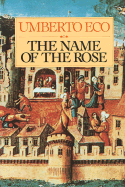Thursday, December 14, 2006
[Book Review] THE NAME OF THE ROSE by Umberto Eco
 Fiction/Mystery Historical
Fiction/Mystery HistoricalJason Ezell reviews THE NAME OF THE ROSE by Umberto Eco (Harcourt Brace Jovanovich, 1983):
The young Brother Adso of Melk recounts the events that took place when he was assigned to assist the peculiar but well-respected Brother William of Baskerville in the politically charged task of ferreting out heresy in the monastic orders of the day. The two arrive at a small Italian abbey with a reputation for its wealth in relics and manuscripts. In a few days' time, the abbey becomes the site of a tense debate over the role of poverty in monastic life. Brother William's sharp detection skills become invaluble when the bodies of dead monks begin to appear on a daily basis, apparently following a pattern of apocalyptic prophecy. Adso and William find themselves lost in a community where secrecy and enlightenment, superstition and reason, church and state, and power and compassion become desperately confused. The abbey becomes a microcosm of the very rifts that threaten to tear Christendom--and civilization itself--apart, and at the very heart of this strained social fabric is a fanatically guarded library full of mirrors, trick doors, ghosts, demonic visions, forbidden books, and the key to the deaths that lie like a humorless darkness over the entire monastery grounds.
Set during a week in 1327, Eco's novels finds in the fusion of ecclesiastic history and mystery a chance to explore some of the most fundamental issues of any period of taxing social change. It also explores the importance of symbols and logical debate. The stylistic strength of the book is the resultant combination of rich descriptive detail (especially when it comes to the art and architecture of the Medieval Church) and philosophy (as seen in the impassioned debates over heresy). Although obviously literary, The Name of the Rose benefits from being a mystery novel, using intrigue, adventure, carefully executed pacing, and suspense to propel the story forward. A careful balance is struck between the honest depiction of complexity and the human desire to make things make sense. And politics--simply understood as the social use of power--is exposed as all-pervasive in that balancing process. The book has an incredibly broad appeal, being a highly respected canonical work at the same time as it is an international bestseller.
Jason Ezell, Humanities Department
Labels: Historical Fiction, Mystery, Reviews by Jason Ezell


